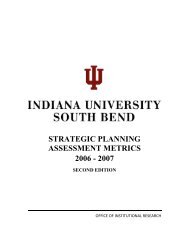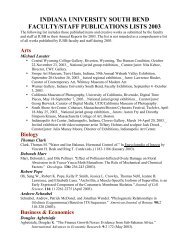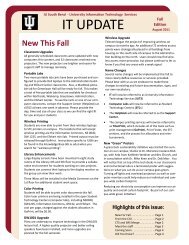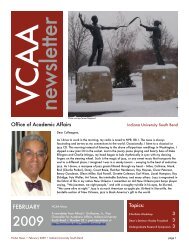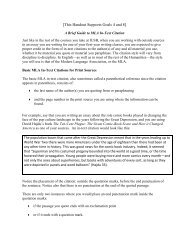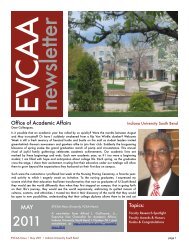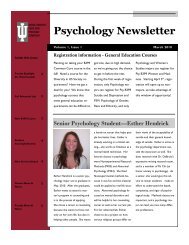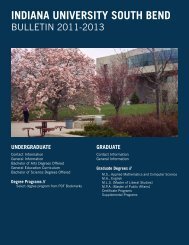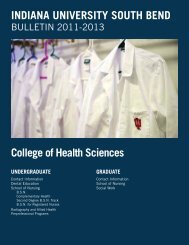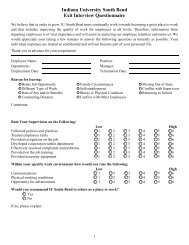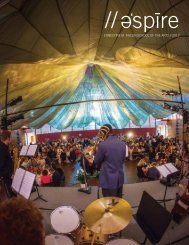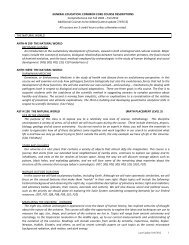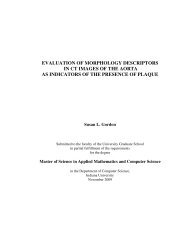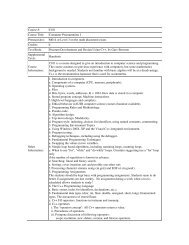- Page 1 and 2:
INDIANA UNIVERSITY SOUTH BEND BULLE
- Page 3 and 4:
BULLETIN 2011-2013 IU SOUTH BEND IN
- Page 5 and 6:
TABLE OF CONTENTS INTRODUCTION TO I
- Page 7 and 8:
GENERAL INFORMATION 47 diversity an
- Page 9 and 10:
Degrees, CERTIFICATES, and MINORS I
- Page 11 and 12:
DEGREES, CERTIFICATES, AND MINORS 4
- Page 13 and 14:
GENERAL INFORMATION 413 questions r
- Page 15 and 16:
GENERAL INFORMATION 415 Office of t
- Page 17 and 18: GENERAL INFORMATION 417 Federal Fin
- Page 19 and 20: GENERAL INFORMATION 419 Academic Sk
- Page 21 and 22: GENERAL INFORMATION 421 Child Devel
- Page 23 and 24: GENERAL INFORMATION 423 Health and
- Page 25 and 26: GENERAL INFORMATION 425 Personal Mi
- Page 27 and 28: GENERAL INFORMATION 427 Post 9/11 T
- Page 29 and 30: ACADEMIC REGULATIONS AND POLICIES 4
- Page 31 and 32: ACADEMIC REGULATIONS AND POLICIES 4
- Page 33 and 34: ACADEMIC REGULATIONS AND POLICIES 4
- Page 35 and 36: ACADEMIC REGULATIONS AND POLICIES 4
- Page 37 and 38: General Education Linda Chen, Assis
- Page 39 and 40: GENERAL EDUCATION 439 PSY-P 211 Met
- Page 41 and 42: GENERAL EDUCATION 441 ANTH-E 105 Cu
- Page 43 and 44: ERNESTINE M. RACLIN SCHOOL OF THE A
- Page 45 and 46: ERNESTINE M. RACLIN SCHOOL OF THE A
- Page 47 and 48: COMMUNICATION ARTS 447 Campuswide C
- Page 49 and 50: MUSIC 449 SPCH-S 380 SPCH-S 427 SPC
- Page 51 and 52: MUSIC 451 of piano class, MUS-P 104
- Page 53 and 54: MUSIC 453 CONCENTRATION IN MUSIC TH
- Page 55 and 56: MUSIC 455 Instrumental Concentratio
- Page 57 and 58: MUSIC 457 MUS-K 410 Applied Composi
- Page 59 and 60: MUSIC 459 Critical Thinking Select
- Page 61 and 62: MUSIC 461 Programs Leading to Other
- Page 63 and 64: INTEGRATED NEW MEDIA STUDIES 463 Cr
- Page 65 and 66: INTEGRATED NEW MEDIA STUDIES 465 Di
- Page 67: INTEGRATED NEW MEDIA STUDIES 467 Co
- Page 71 and 72: THEATRE AND DANCE 471 Contemporary
- Page 73 and 74: VISUAL ARTS 473 Campuswide Curricul
- Page 75 and 76: VISUAL ARTS 475 Art History/Foundat
- Page 77 and 78: VISUAL ARTS 477 upper-divisional re
- Page 79 and 80: School of Business and EConomics Ro
- Page 81 and 82: SCHOOL OF BUSINESS AND ECONOMICS 48
- Page 83 and 84: SCHOOL OF BUSINESS AND ECONOMICS 48
- Page 85 and 86: SCHOOL OF BUSINESS AND ECONOMICS 48
- Page 87 and 88: SCHOOL OF BUSINESS AND ECONOMICS 48
- Page 89 and 90: SCHOOL OF BUSINESS AND ECONOMICS 48
- Page 91 and 92: SCHOOL OF BUSINESS AND ECONOMICS 49
- Page 93 and 94: SCHOOL OF BUSINESS AND ECONOMICS 49
- Page 95 and 96: SCHOOL OF BUSINESS AND ECONOMICS 49
- Page 97 and 98: SCHOOL OF EDUCATION 497 Welcome to
- Page 99 and 100: SCHOOL OF EDUCATION 499 ELEMENTARY
- Page 101 and 102: SCHOOL OF EDUCATION 4101 PRAXIS II
- Page 103 and 104: SCHOOL OF EDUCATION 4103 Probation
- Page 105 and 106: SCHOOL OF EDUCATION 4105 12. Candid
- Page 107 and 108: SCHOOL OF EDUCATION 4107 EDUC-M 311
- Page 109 and 110: Division of Extended Learning Servi
- Page 111 and 112: DIVISION OF EXTENDED LEARNING SERVI
- Page 113 and 114: General Studies School of Continuin
- Page 115 and 116: GENERAL STUDIES 4115 • 2.0 cumula
- Page 117 and 118: GENERAL STUDIES 4117 Upper-Division
- Page 119 and 120:
DENTAL EDUCATION 4119 Dental Educat
- Page 121 and 122:
DENTAL EDUCATION 4121 Academic Regu
- Page 123 and 124:
DENTAL EDUCATION 4123 competency by
- Page 125 and 126:
DENTAL EDUCATION 4125 Bachelor of S
- Page 127 and 128:
DENTAL EDUCATION 4127 pharmaceutica
- Page 129 and 130:
SCHOOL OF NURSING 4129 All provisio
- Page 131 and 132:
SCHOOL OF NURSING 4131 Health and C
- Page 133 and 134:
SCHOOL OF NURSING 4133 IU South Ben
- Page 135 and 136:
SCHOOL OF NURSING 4135 Good Standin
- Page 137 and 138:
SCHOOL OF NURSING 4137 Repeat Polic
- Page 139 and 140:
SCHOOL OF NURSING 4139 graduation.
- Page 141 and 142:
SCHOOL OF NURSING 4141 NURS-S 483 N
- Page 143 and 144:
RADIOGRAPHY AND ALLIED HEALTH 4143
- Page 145 and 146:
RADIOGRAPHY AND ALLIED HEALTH 4145
- Page 147 and 148:
RADIOGRAPHY AND ALLIED HEALTH 4147
- Page 149 and 150:
MEDICAL IMAGING TECHNOLOGY 4149 •
- Page 151 and 152:
PREPROFESSIONAL PROGRAMS—ALLIED H
- Page 153 and 154:
LABOR STUDIES PROGRAM 4153 Certific
- Page 155 and 156:
LABOR STUDIES PROGRAM 4155 SAC cred
- Page 157 and 158:
College of Liberal Arts and Science
- Page 159 and 160:
COLLEGE OF LIBERAL ARTS AND SCIENCE
- Page 161 and 162:
COLLEGE OF LIBERAL ARTS AND SCIENCE
- Page 163 and 164:
AFRICAN AMERICAN STUDIES 4163 Degre
- Page 165 and 166:
BIOLOGICAL SCIENCES 4165 BIOL-L 321
- Page 167 and 168:
CHEMISTRY AND BIOCHEMISTRY 4167 sci
- Page 169 and 170:
CHEMISTRY AND BIOCHEMISTRY 4169 Cri
- Page 171 and 172:
COMPUTER AND INFORMATION SCIENCES 4
- Page 173 and 174:
COMPUTER AND INFORMATION SCIENCES 4
- Page 175 and 176:
CRIMINAL JUSTICE 4175 Bachelor of S
- Page 177 and 178:
ENGLISH 4 177 POLS-Y 107 Introducti
- Page 179 and 180:
ENGLISH 4 179 (All courses are 3 cr
- Page 181 and 182:
EUROPEAN STUDIES 4 181 Note: Some o
- Page 183 and 184:
GERONTOLOGY 4 183 MINOR IN FILM STU
- Page 185 and 186:
INFORMATICS 4 185 study of American
- Page 187 and 188:
INFORMATICS 4 187 INFO-I 210 Inform
- Page 189 and 190:
LATIN AMERICAN STUDIES 4 189 Anthro
- Page 191 and 192:
MATHEMATICAL SCIENCES 4 191 Level 3
- Page 193 and 194:
MATHEMATICAL SCIENCES 4 193 Natural
- Page 195 and 196:
PHILOSOPHY 4 195 Option 2 At least
- Page 197 and 198:
PHYSICS AND ASTRONOMY 4 197 Bachelo
- Page 199 and 200:
PSYCHOLOGY 4 199 The Paralegal Stud
- Page 201 and 202:
RELIGIOUS STUDIES 4 201 Admission R
- Page 203 and 204:
SOCIOLOGY AND ANTHROPOLOGY 4 203 ex
- Page 205 and 206:
WOMEN’S AND GENDER STUDIES 4 205
- Page 207 and 208:
WORLD LANGUAGE STUDIES 4 207 Transf
- Page 209 and 210:
SUPPLEMENTAL AND PREPROFESSIONAL PR
- Page 211 and 212:
SUPPLEMENTAL AND PREPROFESSIONAL PR
- Page 213 and 214:
Graduate admissions and retention A
- Page 215 and 216:
GRADUATE PROGRAMS 4215 Prerequisite
- Page 217 and 218:
ERNESTINE M. RACLIN SCHOOL OF THE A
- Page 219 and 220:
ERNESTINE M. RACLIN SCHOOL OF THE A
- Page 221 and 222:
ERNESTINE M. RACLIN SCHOOL OF THE A
- Page 223 and 224:
School of Business and EConomics Ro
- Page 225 and 226:
SCHOOL OF BUSINESS AND ECONOMICS4GR
- Page 227 and 228:
SCHOOL OF BUSINESS AND ECONOMICS4GR
- Page 229 and 230:
School of Education Michael Horvath
- Page 231 and 232:
SCHOOL OF EDUCATION4GRADUATE DEGREE
- Page 233 and 234:
SCHOOL OF EDUCATION4GRADUATE DEGREE
- Page 235 and 236:
SCHOOL OF EDUCATION4GRADUATE DEGREE
- Page 237 and 238:
SCHOOL OF EDUCATION4GRADUATE DEGREE
- Page 239 and 240:
SCHOOL OF EDUCATION4GRADUATE DEGREE
- Page 241 and 242:
SCHOOL OF EDUCATION4GRADUATE DEGREE
- Page 243 and 244:
SCHOOL OF EDUCATION4GRADUATE DEGREE
- Page 245 and 246:
SCHOOL OF EDUCATION4GRADUATE DEGREE
- Page 247 and 248:
SCHOOL OF EDUCATION4GRADUATE DEGREE
- Page 249 and 250:
SCHOOL OF EDUCATION4GRADUATE DEGREE
- Page 251 and 252:
SCHOOL OF EDUCATION4GRADUATE DEGREE
- Page 253 and 254:
College of Health Sciences Mary Jo
- Page 255 and 256:
COLLEGE OF HEALTH SCIENCES4GRADUATE
- Page 257 and 258:
COLLEGE OF HEALTH SCIENCES4GRADUATE
- Page 259 and 260:
Student Organization Students are e
- Page 261 and 262:
COLLEGE OF LIBERAL ARTS AND SCIENCE
- Page 263 and 264:
COLLEGE OF LIBERAL ARTS AND SCIENCE
- Page 265 and 266:
COLLEGE OF LIBERAL ARTS AND SCIENCE
- Page 267 and 268:
COLLEGE OF LIBERAL ARTS AND SCIENCE
- Page 269 and 270:
IU South Bend Course Descriptions A
- Page 271 and 272:
IU SOUTH BEND COURSE DESCRIPTIONS 4
- Page 273 and 274:
ANTH-E 300 VT: ANTH-E 304 ANTH-E 30
- Page 275 and 276:
IU SOUTH BEND COURSE DESCRIPTIONS 4
- Page 277 and 278:
IU SOUTH BEND COURSE DESCRIPTIONS 4
- Page 279 and 280:
IU SOUTH BEND COURSE DESCRIPTIONS 4
- Page 281 and 282:
IU SOUTH BEND COURSE DESCRIPTIONS 4
- Page 283 and 284:
BUS-W 100 BUS-W 311 BUS-W 406 BUS-W
- Page 285 and 286:
IU SOUTH BEND COURSE DESCRIPTIONS 4
- Page 287 and 288:
IU SOUTH BEND COURSE DESCRIPTIONS 4
- Page 289 and 290:
BUSB-K 507 BUSB-K 510 BUSB-K 515 BU
- Page 291 and 292:
IU SOUTH BEND COURSE DESCRIPTIONS 4
- Page 293 and 294:
CJUS-P 370 CJUS-P 375 CJUS-P 379 CJ
- Page 295 and 296:
IU SOUTH BEND COURSE DESCRIPTIONS 4
- Page 297 and 298:
IU SOUTH BEND COURSE DESCRIPTIONS 4
- Page 299 and 300:
IU SOUTH BEND COURSE DESCRIPTIONS 4
- Page 301 and 302:
IU SOUTH BEND COURSE DESCRIPTIONS 4
- Page 303 and 304:
IU SOUTH BEND COURSE DESCRIPTIONS 4
- Page 305 and 306:
IU SOUTH BEND COURSE DESCRIPTIONS 4
- Page 307 and 308:
IU SOUTH BEND COURSE DESCRIPTIONS 4
- Page 309 and 310:
IU SOUTH BEND COURSE DESCRIPTIONS 4
- Page 311 and 312:
EDUC-G 522 counseling TECHNIQUES (3
- Page 313 and 314:
IU SOUTH BEND COURSE DESCRIPTIONS 4
- Page 315 and 316:
IU SOUTH BEND COURSE DESCRIPTIONS 4
- Page 317 and 318:
IU SOUTH BEND COURSE DESCRIPTIONS 4
- Page 319 and 320:
IU SOUTH BEND COURSE DESCRIPTIONS 4
- Page 321 and 322:
EDUC-P 570 EDUC-P 590 education. Th
- Page 323 and 324:
IU SOUTH BEND COURSE DESCRIPTIONS 4
- Page 325 and 326:
IU SOUTH BEND COURSE DESCRIPTIONS 4
- Page 327 and 328:
IU SOUTH BEND COURSE DESCRIPTIONS 4
- Page 329 and 330:
IU SOUTH BEND COURSE DESCRIPTIONS 4
- Page 331 and 332:
IU SOUTH BEND COURSE DESCRIPTIONS 4
- Page 333 and 334:
IU SOUTH BEND COURSE DESCRIPTIONS 4
- Page 335 and 336:
IU SOUTH BEND COURSE DESCRIPTIONS 4
- Page 337 and 338:
FREN-F 102 FREN-F 203 FREN-F 204 FR
- Page 339 and 340:
IU SOUTH BEND COURSE DESCRIPTIONS 4
- Page 341 and 342:
IU SOUTH BEND COURSE DESCRIPTIONS 4
- Page 343 and 344:
IU SOUTH BEND COURSE DESCRIPTIONS 4
- Page 345 and 346:
HPER-E 159 HPER-E 187 HPER-E 190 HP
- Page 347 and 348:
IU SOUTH BEND COURSE DESCRIPTIONS 4
- Page 349 and 350:
LBST-D 510 LBST-D 511 LBST-D 512 LB
- Page 351 and 352:
IU SOUTH BEND COURSE DESCRIPTIONS 4
- Page 353 and 354:
IU SOUTH BEND COURSE DESCRIPTIONS 4
- Page 355 and 356:
IU SOUTH BEND COURSE DESCRIPTIONS 4
- Page 357 and 358:
IU SOUTH BEND COURSE DESCRIPTIONS 4
- Page 359 and 360:
IU SOUTH BEND COURSE DESCRIPTIONS 4
- Page 361 and 362:
IU SOUTH BEND COURSE DESCRIPTIONS 4
- Page 363 and 364:
IU SOUTH BEND COURSE DESCRIPTIONS 4
- Page 365 and 366:
IU SOUTH BEND COURSE DESCRIPTIONS 4
- Page 367 and 368:
IU SOUTH BEND COURSE DESCRIPTIONS 4
- Page 369 and 370:
IU SOUTH BEND COURSE DESCRIPTIONS 4
- Page 371 and 372:
IU SOUTH BEND COURSE DESCRIPTIONS 4
- Page 373 and 374:
NURS-S 482 NURS-S 483 NURS-S 485 NU
- Page 375 and 376:
IU SOUTH BEND COURSE DESCRIPTIONS 4
- Page 377 and 378:
IU SOUTH BEND COURSE DESCRIPTIONS 4
- Page 379 and 380:
IU SOUTH BEND COURSE DESCRIPTIONS 4
- Page 381 and 382:
IU SOUTH BEND COURSE DESCRIPTIONS 4
- Page 383 and 384:
IU SOUTH BEND COURSE DESCRIPTIONS 4
- Page 385 and 386:
IU SOUTH BEND COURSE DESCRIPTIONS 4
- Page 387 and 388:
IU SOUTH BEND COURSE DESCRIPTIONS 4
- Page 389 and 390:
IU SOUTH BEND COURSE DESCRIPTIONS 4
- Page 391 and 392:
IU SOUTH BEND COURSE DESCRIPTIONS 4
- Page 393 and 394:
SPAN-S 411 SPAN-S 412 SPAN-S 416 SP
- Page 395 and 396:
IU SOUTH BEND COURSE DESCRIPTIONS 4
- Page 397 and 398:
IU SOUTH BEND COURSE DESCRIPTIONS 4
- Page 399 and 400:
IU SOUTH BEND COURSE DESCRIPTIONS 4
- Page 401 and 402:
IU SOUTH BEND COURSE DESCRIPTIONS 4
- Page 403 and 404:
IU SOUTH BEND COURSE DESCRIPTIONS 4
- Page 405 and 406:
notes 4405
- Page 407 and 408:
PURDUE UNIVERSITY COLLEGE OF TECHNO
- Page 409 and 410:
PURDUE UNIVERSITY COLLEGE OF TECHNO
- Page 411 and 412:
PURDUE UNIVERSITY COLLEGE OF TECHNO
- Page 413 and 414:
PURDUE UNIVERSITY COLLEGE OF TECHNO
- Page 415 and 416:
PURDUE UNIVERSITY COLLEGE OF TECHNO
- Page 417 and 418:
PURDUE UNIVERSITY COLLEGE OF TECHNO
- Page 419 and 420:
PURDUE UNIVERSITY COLLEGE OF TECHNO
- Page 421 and 422:
PURDUE UNIVERSITY COLLEGE OF TECHNO
- Page 423 and 424:
RESERVE OFFICERS’ TRAINING CORPS
- Page 425 and 426:
RESERVE OFFICERS’ TRAINING CORPS
- Page 427 and 428:
Resident Faculty, Librarians, and A
- Page 429 and 430:
RESIDENT FACULTY, LIBRARIANS, AND A
- Page 431 and 432:
RESIDENT FACULTY, LIBRARIANS, AND A
- Page 433 and 434:
RESIDENT FACULTY, LIBRARIANS, AND A
- Page 435 and 436:
RESIDENT FACULTY, LIBRARIANS, AND A
- Page 437 and 438:
RESIDENT FACULTY, LIBRARIANS, AND A
- Page 439 and 440:
FACULTY EMERITI 4439 • Clipper, L
- Page 441 and 442:
ASSOCIATE FACULTY 4441 Associate Fa
- Page 443 and 444:
ASSOCIATE FACULTY 4443 • Grondin,
- Page 445 and 446:
ASSOCIATE FACULTY 4445 • Mullin,
- Page 447 and 448:
ASSOCIATE FACULTY 4447 V • Vanden
- Page 449 and 450:
INDEX 4449 Clinical Regulations 128
- Page 451 and 452:
INDEX 4451 H Health and Wellness Ce
- Page 453 and 454:
INDEX 4453 Psychology 197 Psycholog
- Page 455:
INDIANA UNIVERSITY BULLETINS Indian



